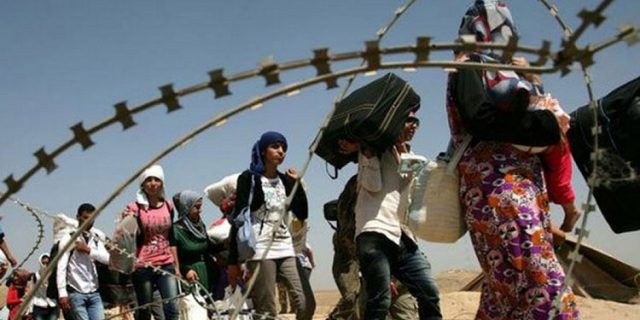Statement:
How EU funds in Türkiye fuel human Rights Violations & forced deportations
6 November 2024
The undersigned Civil society organisations express concern over the misuse of EU funds for forced deportations just outside of the borders of the European Union in Türkiye.
Recent investigative report led by Lighthouse Reports and media partners El País, Der Spiegel, Politico, Etilaat Roz, SIRAJ, NRC, L’Espresso, and Le Monde, has revealed a systematic mistreatment in EU-funded removal centres, managed by the Turkish authorities.
The incidents occurring in removal centres and the forced returns carried out under the guise of voluntary return used as a leverage by authorities have long been a topic of concern for those working in the field of migration and asylum in Türkiye.
The grave human rights violations uncovered include the arbitrary detention of refugees in EU-funded removal centres, the use of torture and abuse against detainees, forced deportations to unsafe countriesin violation of the principle of non-refoulement, denial of legal aid, and fatal consequences for some deportees. The report’s revelations shed light on a disturbing shift in the European Union’s migration policies, where funding initially intended for humanitarian aid has been repurposed to facilitate deportations, resulting in severe abuses against refugees and migrants.
Despite the strong criticism of local CSOs and the international community, in 2016, the European Union and Türkiye reached an agreement aimed at curbing migration flows into Europe. The EU has committed over €11 billion in financial support, to help Türkiye host millions of people fleeing the Syria due to the conflict. A significant portion of this funding has been directed toward strengthening Türkiye’s border control and containment capabilities.
Since 2016, Türkiye has increasingly used this EU-funded infrastructure for deportation-focused policies, resulting in the return of thousands of Syrians, Afghans, and other vulnerable groups to dangerous conditions in their home countries. In October 2024, the European Council adopted conclusions that underscored the EU’s commitment to adopting an even more restrictive approach to migration. This includes accelerated deportations, increased external border security, an expanded use of offshore asylum processing centres and strengthened partnerships with non-EU countries for migration management. This reflects a broader policy approach by the EU and member states, prioritising deterrence and returns over refugee protection, influenced by the rise of far-right political pressures within Europe.
Türkiye, in turn, has long employed return policies targeting Syrian refugees and other nationals, exacerbating human rights violations. The undersigned organisations, have consistently raised concerns about the Turkish government’s political instrumentalisation of refugee policies, particularly in relation to encouraging Syrian refugees to return to their unsafe country
We, the undersigned, are concerned about the practice of forced deportations, particularly to unsafe countries such as Syria and Afghanistan, where returnees face significant risks to their lives and safety. These actions violate international law, in particular the principle of non-refoulement and EU legal frameworks designed to protect refugees and asylum seekers.
The European Union, as a primary funder, has the primary responsibility of these operations. Previous investigations showed similar misuse of EU funds being used for deportations in North Africa as well. EU funds should never be used to support activities that result in human rights violations. We call on the European Commission to publicly account for the allocation of funds provided to Türkiye and ensure that any funding is fully aligned with EU human rights standards.
The undersigned organisations call for:
- EU to immediately halt all funding for any Turkish facilities implicated in forced deportations until a full, transparent, and independent review is conducted.
- An independent international investigation, involving civil society organisations, must be launched to thoroughly examine the misuse of EU funds and to ensure accountability for any abuses uncovered.
- EU to systematically conduct ex-ante Human Rights Impact Assessments before any programme is signed with a third country. Where an agreement is in place, as is the case with Türkiye, continuous checks, reviews, and suspension of the program when human rights are not respected, is necessary.
- EU to adhere to its own human rights commitments in all migration policies and ensure that its financial contributions do not contribute to further human suffering.
The undersigned organisations
ARCI
Association for Monitoring Equal Rights (ESHID) – Turkey
Association Marocaine Des Droits Humains – AMDH
Cairo Institute for Human Rights (CIHRS)
Center for Legal Aid – Voice in Bulgaria
Citizens’ Assembly – (h)Yd
CNCD-11.11.11
Comisión Española de Ayuda al Refugiado – CEAR
EuroMed Rights
Fondation pour la Promotion des Droits en Algérie
Greek Council for Refugees (GCR)
Human Rights Association (İHD) – Turkey
Human Rights Agenda Association (İHGD) – Turkey
Human Rights Joint Platform (İHOP) – Turkey
Iridia – Center for the Defense of Human Rights
Kaos Gay and Lesbian Cultural Research and Solidarity Association (Kaos G) – Turkey
KISA (KISA – Equality, Support, Antiracism)
Ligue des droits de l’Homme (LDH) France
Rights Initiative Association (HİD) – Turkey
Safe Passage International

